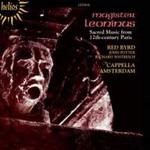
Magister Leoninus I: Sacred Music from 12th-century Paris
 $25.00
Out of Stock
$25.00
Out of Stock6+ weeks add to cart
LEONIN
Magister Leoninus I: Sacred Music from 12th-century Paris
Red Byrd
[ Hyperion Helios / CD ]
Release Date: Sunday 20 November 2011
This item is currently out of stock. It may take 6 or more weeks to obtain from when you place your order as this is a specialist product.
"Sung with beguiling beauty. These readings renew our sense of wonder at western music's most fundamental innovation-the sound of two voices simultaneously singing different lines that not only fit with, but also enhance, each other"
(Sunday Times)
"A fine contribution to the repertoire on disc of twelfth-century polyphony. A composite sound of great beauty"
(Gramophone)
Little is known about Léonin beyond the fact that he seems to have had a bent for composing erotic poetry. The somewhat unhelpfully named 'Anonymous IV', a monk from Bury St Edmunds, tells us of two 'masters'-Leoninus and Perotinus-who dominated the twelfth-century musical world. Both were reputedly based at Notre Dame in Paris, and Leoninus was responsible for the Magnus liber organi, the 'Big Book of organum' (an organum being a polyphonic setting of plainchant), which is widely regarded as the single greatest achievement in the development of early polyphony.
For the technically minded, this is music of great complexity, involving interwoven usage of such styles as organum per se, duplum, clausula, and discantus (terms which even medieval theorists took great pleasure in dissecting in an attempt to define their function).
For the rest of us, this is music of fascinating beauty: a combination of the static tranquillity of the plainchant and the florid ornamentation of the 'composed' elements-which have something of the feel of nineteenth-century coloratura six hundred years before its time.
Tracks:
Alleluya. Non vos relinquam orphanos
Alleluya. Dulce lignum, dulces clavos
Alleluya. Spiritus Sanctus procedens
Alleluya. Paraclitus Spiritus Sanctus
Priusquam te formarem
Alleluya. Inter natos mulierum
Viderunt omnes fines terre
Alleluya. Dies sanctificatus illuxit nobis
Alleluya. Pascha nostrum immolatus est